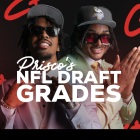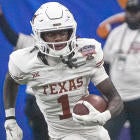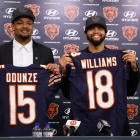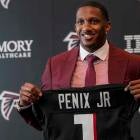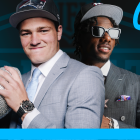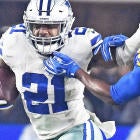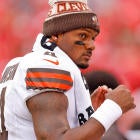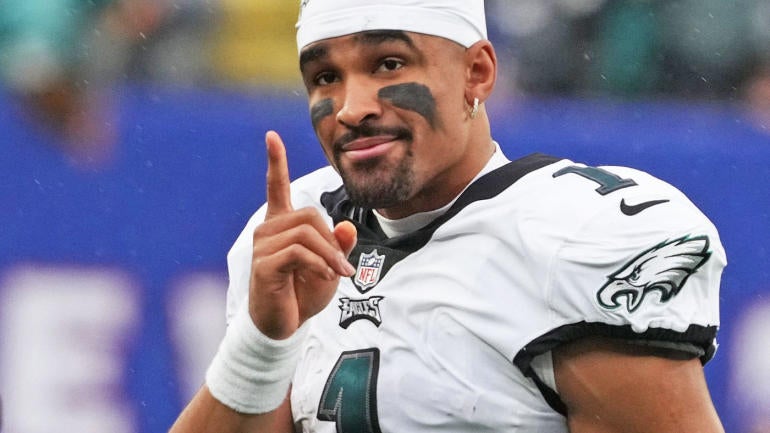
Jalen Hurts said "we've moved on" during the Eagles' first training camp practice in reference to February's Super Bowl loss to the Chiefs.
I suppose that's the type of mindset Hurts has used to overcome different hurdles in his football career to become one of the best quarterbacks on the planet.
It hasn't always been easy. He was benched for Tua Tagovailoa in Alabama's thrilling national championship win over Georgia. He lost in the College Football Playoff semifinals after transferring to Oklahoma, where he also finished runner-up in the 2019 Heisman Trophy race to Joe Burrow. Now he must overcome finishing second to Patrick Mahomes in the NFL MVP race and losing to Mahomes' team in the Super Bowl.
It isn't easy being Jalen Hurts. Just kidding. The All-Pro quarterback now makes over $50 million per year and if history is any indication, it won't be long before he's racking up the hardware to match the cash.
That's because Hurts is the seventh player in football history to finish second in both Heisman Trophy voting and NFL MVP voting at some point in a career.
Check out the other six:
Peyton Manning
Manning finished second in the 1997 Heisman voting behind Charles Woodson, the only defensive player to ever win the award. By the way, Randy Moss finished fourth and Ricky Williams finished sixth that year in one of the most loaded Heisman ballots ever. Manning then tied Marshall Faulk for second in NFL MVP voting just two years later, finishing runner-up to Kurt Warner. He also had two other MVP runner ups in his career (2005, 2012). The close, but no cigar finishes certainly didn't slow down Manning. He won an NFL-record five MVPs to go along with two Super Bowls during his iconic career.
Marshall Faulk
Faulk finished second in the 1992 Heisman voting behind Miami QB Gino Torretta. He was also runner-up to his teammate Kurt Warner in the aforementioned 1999 NFL MVP race, a season where he had 1,000 rushing yards and 1,000 receiving yards. Things worked out okay for Faulk. He won a ring in 1999 and an MVP the following year. He's the only player with 10,000 rushing yards and 6,000 receiving yards in NFL history.
Steve Young
Young was second in the 1983 Heisman voting while at BYU behind Nebraska RB Mike Rozier. He was also the runner-up to Emmitt Smith for the 1993 NFL MVP. Young proved that patience is a virtue as he won two MVP awards and Super Bowl XXIX MVP during his illustrious career.
John Elway
Elway was second in the 1982 Heisman race behind Herschel Walker and second to Brett Favre in 1996 NFL MVP voting. He got the last laugh though. After losing in his first three Super Bowl trips, Elway beat Favre and the Packers to win the Super Bowl in the 1997 season, and the Falcons in the 1998 season. He also edged out Jerry Rice and Joe Montana for the 1987 NFL MVP award.
O.J. Simpson
Simpson was second to UCLA QB Gary Beban for the 1967 Heisman Trophy before winning the award in 1968. He also finished second to Fran Tarkenton for the 1975 NFL MVP award. At that point he had already won an NFL MVP in 1972 after rushing for an NFL-record 2,003 yards in 14 games!
Bob Griese
Griese was second for the '66 Heisman and finished runner-up to Walter Payton for the 1977 NFL MVP award. Don't feel too bad for Griese though. He started Super Bowl VII against Washington as the Dolphins completed their perfect season.
So if history repeats itself, Hurts will prove that his 2022 season was just the beginning. Those six players are all in the Pro Football Hall of Fame and won either a Super Bowl or NFL MVP in their careers. Griese was the only one in the group who didn't win an NFL MVP and Simpson was the only one without a Super Bowl ring. All told, the six combined for 10 NFL MVP awards and 10 rings.














